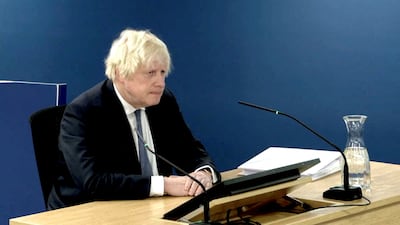Former Prime Minister Boris Johnson visibly struggled to hold back tears as he recounted his personal battle with Covid-19 and his time in intensive care as he gave evidence for a second day at an inquiry into the UK government's handling of the pandemic.
He complained of “absolutely absurd” characterisations of the Partygate scandal around Downing Street rule-breaking as he defended his handling of the latter stages of the pandemic.
He insisted on Thursday that he was not “reconciled” to Covid deaths nor thought it wise to “let the virus rip” rather than impose a second lockdown in the autumn of 2020.
Mr Johnson shared his harrowing experience in intensive care in April of that year, observing how the illness affected not just the elderly but also middle-aged people like himself.
At one stage, he appeared to become emotional as he talked about being admitted to intensive care, and expressed deep gratitude towards the NHS.
His personal encounter with the disease, he stressed, left him with no doubts about its severity and the extent of suffering it caused nationwide.
In response to suggestions that he was indifferent to the public's suffering, Mr Johnson said: “To say that I didn’t care about the suffering that was being inflicted on the country is simply not right.”
However, the inquiry's lead counsel, Hugo Keith KC, clarified that the issue was not about Mr Johnson's concern for the suffering but rather about his perceived indifference to the public's reaction to the behaviour of those in Downing Street.
Mr Johnson dismissed characterisations of his administration's handling of the pandemic, particularly in the latter stages, as “absolutely absurd”.
Boris Johnson's time as British Prime Minister – in pictures
A significant portion of his two days at the inquiry revolved around events leading up to the second national lockdown and the subsequent public reaction to the revelations of rule-breaking within Downing Street, which became known as Partygate.
The scandal, which exposed lockdown-breaching parties at Number 10, ultimately culminated in Mr Johnson's resignation from high office and his later decision to step down as a Member of Parliament.
During the inquiry session, Mr Johnson was confronted with a WhatsApp message dated December 17, 2021, in which he advised the then-Cabinet Secretary, Simon Case, to reflect on the conduct within Number 10, notably mentioning Lee Cain, a key adviser.
Despite acknowledging the need for introspection, Mr Johnson emphasised the importance of moving forward.
Mr Johnson also took the opportunity to criticise the media's portrayal of Partygate, arguing that the dramatised representations were far removed from actual events inside Number 10.
Boris Johnson makes 'wholehearted apology' for Partygate – in pictures
He defended the civil servants and advisers, claiming that the portrayal of their actions was a gross misrepresentation of the truth.
Mr Johnson strongly refuted the suggestion that he endorsed a “let it rip” strategy and, while acknowledging that such notions were discussed, said they never shaped the government's policy.
The former prime minister insisted that the actions and statements made during his tenure did not align with a passive acceptance of fatalities nor an inclination to allow the virus to spread uncontrolled.
In his testimony, Mr Johnson also highlighted the government's swift move to a national lockdown during the first wave, followed by a regional approach, and then another lockdown at the end of October 2020.
He emphasised that these actions were indicative of a government fully engaged in mitigating the crisis and not one resigned to let the virus run its course.






















































